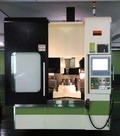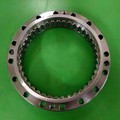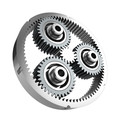text to clipboard
NUM helps Taiwanese machine tool company to automate production of involute and cycloidal gears for robotics
unique multi profile capability helps increase manufacturing productivity
May 15, 2019 — NUM is helping the Taiwanese machine tool company Chien Wei Precise Technology to develop innovative CNC grinding machines for manufacturing specialist gears used in robotics applications.
Based entirely on NUM’s latest-generation Flexium+ 68 CNC platform, Chien Wei’s new machines are designed to speed the production of both involute and cycloidal profile precision gears. They are believed to be the first gear grinding machines on the market that are capable of handling both types of gear profile. There are two versions of the grinding machine, one for internal gears, the other for external gears.
Founded in 1981, Chien Wei Precise Technology Co., Ltd is based in Fengshan District in southern Kaohsiung, Taiwan. The company initially specialised in precision machine tools such as vertical grinders, jig grinders and machining centres, together with co-ordinate measuring machines (CMMs). Over time, it also diversified into robotic automation systems.
Robotic systems typically use either planetary gearboxes equipped with involute gears, or cycloid drives based on a combination of a reduced epitrochoid rotor and a cycloid stator. While planetary gearboxes have been around for a long time and enjoy extensive use, cycloid drives have far fewer moving parts and offer a more efficient means of achieving extremely high reduction rates. A speed reducer with a ratio of 200:1 would typically need a chain of three planetary gear boxes with twelve moving involute gears. The same reduction ratio could be achieved with a cycloid drive using one stator and one rotor. However, cycloid gears are notoriously difficult and expensive to manufacture.
In 2015, Chien Wei decided to bring gear manufacturing in-house, by developing its own gear grinding machine. By producing its own gearboxes the company could control quality, shorten lead times and reduce costs. It would also enable it to sell gearboxes to machine builders – and possibly the machines themselves to gear manufacturers.
Chien Wei initially based its gear grinding machine on a Fanuc series 0i-MF CNC system, which it uses for other machine tools, together with Mastercam CAD/CAM software and its own CMM. But it soon became apparent that the profile complexity of cycloidal gears meant that CMM data was inadequate for controlling the manufacturing process. Another major disadvantage was that customers wishing to purchase the machines would also need to invest in an expensive CAD/CAM system and extra personnel.
According to Chien Wei’s President, Mr Lee, “We quickly decided that what we needed was a CNC system that fully supported gear grinding from the outset, so that our customers could simply input the parameters of the gear they wanted, with the CNC then controlling all aspects of the machine’s dressing and grinding processes in real-time. NUM was an obvious choice, because of its proven expertise in CNC gear grinding applications. The company was also willing to collaborate in the joint development of the CNC system, which includes an application-specific HMI (human-machine interface) and various dedicated control functions.”
The new generation of Chien Wei’s gear grinders together with NUM’s new profile grinding technology now provides the ability and flexibility to manufacture both cycloid and involute gears on the same machine.
Adrian Kiener, CSO Asia and Managing Director of NUM Taiwan, points out that this application highlights the importance of NUM’s decentralised support strategy. “By providing direct access to the CNC experts and extensive development facilities we have here in Taiwan, as well as those in many other countries around the world, we are able to provide our customers with a very fast response service that helps them shorten their time-to-market significantly. In combination with the knowledge and experience of our gear product group in Switzerland, this led to the complete package that NUM is providing. It includes the user interface, technology and calculations, as well as all the NC cycles.”
Chien Wei’s internal gear grinder is a 9-axis machine. The work piece table is mounted on a linear axis that moves axially towards the grinding wheel, which is belt-driven (due to space constraints inside the gear) and mounted on a vertical axis driven by a linear motor. As the grinding wheel spins, it is driven up and down by the linear axis, while the work piece table moves in continuously. Both flanks of the gear are ground simultaneously. The machine also handles gear dressing. During the dressing cycle, the entire tool head is moved horizontally to the right, and a symmetrical dressing disk moves along the outer shape of the grinding wheel in three sections, right/left flank and tip. Cycloids as well as involute shapes can be dressed.
The external gear grinder is an 8-axis machine. Broadly similar to the internal gear grinder in operational terms, it features a direct drive grinding wheel. Again, like the internal gear grinder, it also handles dressing. However, in this case the shape of the tooth gap can be reduced epitrochoids or involutes.
Manual correction of the gear tooth shapes is possible on either machine.
Both machines are controlled by NUM Flexium+ 68 CNC systems, equipped with NUM FS153i touch-sensitive operating panels. The application-specific HMI that has been jointly developed by NUM Taiwan and Chien Wei controls both the grinding and dressing cycles, and allows users to fully specify the required gear profile simply by entering the appropriate parameters. Graphical DXF (Drawing Interchange Format) files can be imported from – and exported to – CAD systems, and the system features a comprehensive database for grinding wheels and work pieces. The NC programs are generated entirely automatically, without any need for operator involvement.
As Johnny Wu, Sales Manager for NUM Taiwan, points out, “NUM’s open architecture CNC platforms, combined with the company’s willingness to partner with machine builders in developing application-specific solutions, is a key differentiator when it comes to choosing a CNC supplier.”
ENDS
Technical background note for editors
Reduction gearboxes for robotic applications
Most robotic systems demand smooth, precise and highly reliable low speed movement. Deriving that movement from a motor that runs optimally at, say, 1000 rpm necessarily involves some form of speed reduction gearbox. Designers typically have a choice of two types of reduction gearbox – planetary drives and cycloid drives.
Image: Typical planetary gearbox
http://www.wordsun.com/assets/press/num86p5.jpg
Planetary drives (or gearboxes) use one sun gear in the middle and planet gears around it, all imbedded into a ring. All of the gears, including the ring, have involute profiles. These types of drives are ubiquitous – they are used in a broad diversity of applications, including cars and other road vehicles, and are produced by virtually every gear manufacturer in the world.
The other type of speed reduction gear drive is the cycloid gear box. It does not have sun and planet gears, so it is not a planetary gear drive. Instead, a cycloid gearbox has one or two external rotors in the middle, and one internal stator as the ring.
Image: typical cycloid gearbox
http://www.wordsun.com/assets/press/num86p6.jpg
Gearboxes that use cycloid gears have very few moving parts and are some of the most efficient and reliable speed reducers available today. Single stator/rotor combinations can accommodate ratios as high as 300:1 and can provide efficiencies in excess of 93 percent.
Chien Wei’s latest generation gear grinding machines, incorporating NUM’s new profile grinding technology, now enable gear manufacturers to produce both cycloid and involute gears on the same machine. This significantly increases manufacturing flexibility – production can be switched from one type of gear to the other without changing over machines.
NUM is active in social media. To become a follower visit: https://twitter.com/NUM_CNC
For more information, please contact:
Steve Moore, NUM (UK) Ltd, Unit 5 Fairfield Court, Seven Stars Industrial Estate, Wheler Road, Coventry CV3 4LJ, UK.
Tel: +44 (0)871 750 4020; sales.uk@num.com; www.num.com.
NUM AG, Battenhusstrasse 16, CH-9053 Teufen, Switzerland. Tel: +41 71 335 04 11; sales.ch@num.com; www.num.com.
Chien Wei Precise Technology Co., Ltd, No. 20-16, Chen Pei N. Lane, Fengshan District, Kaohsiung 83041, Taiwan.
Tel: +886 7 7313911; info@chienwei.com.tw; www.chienwei.com.















 |
|